- Home
- Richard F. Weyand
Commander Page 4
Commander Read online
Page 4
“That many? Won’t that push prices up?”
“No. First, there is a sizable inventory built up already. Second, the bank, which will hold lien on the ships, will negotiate the purchase arrangements. The volume pricing agreement will specify pricing in advance. It won’t be allowed to float over the purchase period. I would expect that volume pricing to be lower than the spot pricing that attracted your attention in the first place.”
“In that case, I think eighty thousand ships is workable from our end. Within the terms we’ve discussed, of course. In particular the accumulation of interest accrued against principal for the first two years.”
“Of course, Mr. Stauss. All as specified.”
“Then I think we have a deal, Mr. Kaube.”
“A transaction of this magnitude will have to be approved by the corporate office, but I anticipate no difficulties.”
“Well, let us know.”
“And in the meantime, we will draw up the paperwork.”
“I can’t believe we just bought eighty thousand ships for a down payment of 350,000 Imperial credits apiece,” Dieter said on their way back to the office.
“Well, the bank owns the rest of the interest in the ships, but we just saved their ass on those shipbuilders’ loans.”
“I still can’t believe it.”
“Never forget. If you owe the bank a thousand credits and you can’t pay it, you’re in trouble, but if you owe the bank a trillion credits and you can’t pay it, the bank’s in trouble. And if all those shipbuilding firms fail, the bank’s in serious trouble. So’s the Navy, for that matter.”
It was the weekly meeting of the banking oversight department heads. Jeremy Boscomb, the head of the consumer loans oversight department, was chairing this week.
“Anybody have anything they want the group’s advice on this week?” Boscomb asked.
“I have one,” said Brent Oster, the head of the commercial loans oversight department. “I have a commercial loan application that was sent in for approval.”
“Sent in for approval? How big does a commercial loan have to be to require government approval?” Melody Johnson asked.
“A trillion credits. This one’s more like a trillion and a half.”
“What is somebody borrowing against that amounts to a trillion and a half credits?” Boscomb asked.
“Eighty thousand freighters,” Oster said.
“Eighty thousand freighters?” Susan Price asked.
“Yes. Eighty thousand.”
“What is the total annual production of freighters in the Empire?” Boscomb asked.
“About a hundred and fifty thousand keels laid. So this is more than half a year’s production. It’s also all the bigger freighters. It’s more than a whole year’s production of the large-capacity ships.”
“Wow,” Andy Korman said. “Is he trying to corner the market?”
“No clue. I don’t know what to do with it.”
“I think this is above our pay grade. You should probably bounce it upstairs,” Johnson said.
“Oversight or Investigations, do you think?” Oster asked.
“Oversight, I would say,” Boscomb said. “If they want to call in Investigations, they can.”
“OK, good,” Oster said. “I just wanted to be sure I wasn’t overreacting by bouncing it upstairs.”
“I wouldn’t think so. Eighty thousand freighters? Ye gods,” Price said.
Oster bounced the issue up to Oversight, which took one look at the numbers and bounced it up to the co-consul’s office. Geoffrey Saaret, co-consul to the Emperor Trajan, assigned his staff to look into it. Among those working on it in the co-consul’s office was Amanda Peters, whose university degree was in finance, and who had previously worked in the finance office of the Imperial Palace.
Of course, Amanda Peters was also the Empress Consort Amanda, wife of the Emperor Trajan.
It was Saturday afternoon and they were at the swimming pool of the Imperial gardens on the roof of the palace. Peters had swum her laps, nude as was her custom, while Dunham lounged nude on a chaise on the pool deck and watched. She joined him on the chaise to warm up, which usually, as today, ended up with the happy young couple making love in the warm sunshine. Afterwards, cuddled up together under a big beach towel to avoid sunburn, was the most comfortable and stress-free time of Dunham’s week.
It was also a time for conversation, often about business. Peters had shown she could have brilliant insights into the big picture, such as with the Navy’s unit cohesion problem, and she was one of Dunham’s most important and trusted advisers.
“Amanda.”
“Mmm?”
“Has Geoffrey had you looking at this loan application for Otto Stauss to buy eighty thousand freighters?”
“Yes. I’m one of the people on it, because it’s a finance question. We haven’t issued the final report yet.”
“What do you think?”
“I think it’s a brilliant move by Otto Stauss. He stands to make a great deal of money.”
“Is he trying to corner the freighter market?”
“No. He can’t, Bobby. The Empire’s shipbuilding industry can lay down about two hundred and fifty thousand keels a year. A hundred thousand of those are military ships, and the rest are mostly freighters, with a few passenger liners thrown in. But the Imperial Navy isn’t buying warships while the new ship designs are in progress, so there’s a hundred thousand empty slots in the shipbuilding capacity every year. Actually more, because a military ship takes up a spacedock for a longer period than a freighter.”
“So what he’s really doing is letting the shipbuilders fill up their empty production slots.”
“Exactly. The regular freighter construction is going ahead, and there’s the regular market demand for those. He’s buying up a lot of the extra capacity.”
“You know when the military starts buying again, we’re going to be buying at a much heavier pace than before. Freighter production will go way down for a while.”
“And Stauss either knows that or guesses it. He’s basically arbitraging the shipbuilders’ spacedock capacity over time. As I say, it’s a brilliant move.”
“Should I block the loan, Amanda?”
“No! He’s doing us a huge favor. Shipbuilding is a capital-intensive industry. All those spacedocks, the cargo shuttles for bringing the parts up to orbit, the personnel shuttles for bringing the spacedock workers up to orbit – all that stuff is ridiculously expensive. It’s all bought with capital loans and amortized over time. But we’ve disrupted the shipbuilders’ normal cash flows by holding back on buying warships while the new designs are under way.”
“No sense buying warships we won’t use.”
“Agreed. But shipbuilders – especially the ones that are heavily involved in warship building – no longer have the cash flow to keep making the payments on those capital loans. So what happens then, Bobby?”
“The Imperial Bank has to call the loans.”
“Exactly. The banking regulations require it, and for good reason. We don’t want the banks, especially Imperial Bank, speculating, bridging bad loans and the like. If it all blows up, the banking system collapses. Here it would help us, but it would be a bad precedent to set. So along comes Otto Stauss, who sees what’s going on, and he offers the Imperial Bank a way to keep the shipbuilders paying their loans by keeping their spacedocks busy until the Imperial Navy starts buying warships again.”
“And when we do, and there is little to no spacedock capacity available for freighter construction....”
“Otto Stauss makes a ton of money. It’s a big gamble on his part. He’s putting quite a bit of his personal fortune on the line as well.”
“But his capital investment is small compared to the magnitude of the transaction, Amanda.”
“That’s not his point, Bobby. He’s making sure the bank knows he’s got skin in the game. And I’ve looked into Otto Stauss. He doesn’t make big risky plays. He makes
the occasional big play, but they’ve always worked out. Been obvious in hindsight, as a matter of fact. This looks like a big risky play, but he’s got it sussed. He knows what’s going on.”
“And everybody else? Why isn’t everybody else trying the same thing?”
“Other freight companies are accelerating their ship acquisitions while prices are down, but nobody is jumping in for the big play. They’re too conservative for that kind of move, especially shareholder-owned companies. Stauss is the biggest of the privately held shipping companies, and he’s up for the big play on this one.”
“So I should let it go ahead.”
“Oh, you betcha. I would even give the bank leeway to expand the deal. Otto Stauss deserves a medal, because we’re going to need all those shipbuilders in another year or so. He’s going to keep them alive while we work up our new ship designs. And without us having to step in to rescue them, which, as I say, would set a bad precedent.”
“And if it blows up?”
“Then we have to step in anyway. And it’ll be a lot easier, because all the problems with multiple shipbuilders will have been consolidated into one bad loan, and it will be secured with a bunch of portable and marketable new freighters rather than a lot of used specialty spacedock equipment. Much easier to deal with.”
Otto and Dieter Stauss met with Gunther Kaube and his assistants in the Baden Sector headquarters of the Imperial Bank in Heidelberg.
“The loan application is back from Imperial Bank headquarters on Sintar, Mr. Stauss. In fact, headquarters sent the loan application to the Imperial government regulators for approval, given its size.”
“And, Mr. Kaube? What did they say?”
“They have approved the loan as structured. As a matter of fact, they approved the loan for up to twice the initial principal the application asked for.”
“With the same capital investment on my part?” Stauss asked.
“Yes,” Kaube said, as if he couldn’t believe it himself.
“Ha! Then I’m right, and they know it.”
“Apparently so, Mr. Stauss.”
“All right then. So you should draw up the purchase contracts with the shipbuilders, but put in options for additional ships at the same prices. Let’s make sure we can soak up as many of those ships at volume pricing levels as we can. And, of course, give precedence to those shipbuilders who are most at risk of default.”
“Those are the ones who will negotiate the lowest per-hull prices, Mr. Stauss, so the negotiations will naturally run that way in any case.”
“Excellent, Mr. Kaube. Let’s get this deal together. Draw up those purchase agreements, and let’s get buying those ships.”
Design Issues
“The problem with all these warship designs, once we work the numbers, is they just have too much polar moment to be quick on the turn,” Jared Denny said. “I mean, the current warships are sluggish on the turn as well, but I would think without fragile crew aboard and losing all the support mass for the crew, we could do better.”
“Well, when you take all the crew accommodations off, the impeller, the magazines, the engines, and the reaction mass are the only large masses left,” Vipin Narang said.
“And they’re strung out along the length of the ship,” Liu Jiang said.
“Which is as long as it has to be to accommodate the missile impeller. I understand,” Denny said. “Isn’t there some way we can reorganize the masses to reduce the polar moment, though?”
“The reaction mass has to be in front of the engines, because it is largely gravity feed,” Liu said. “And we can’t have the impeller move back in the ship or it’s in the wash of the engines. It’s all the way back as far as it can go already.”
“We could probably move the magazines further back,” Narang said. “The engines are arranged around the impeller, though, so we have to feed the impeller through a gap in the engines.”
“Do the engines need to be equally spaced? If we clustered them in pairs, would we open up enough room between the pairs to feed the impeller?” Denny asked.
They were reorganizing a three-D model in the VR as they talked. The magazines moved back, around the engines, and the engines, rather than equally spaced around the ship’s axis, were now grouped in pairs above and below the redundant feed ways for the impeller.
“OK. What’s the polar moment on that?” Liu asked.
“Better,” Denny said. “The reaction mass is still a problem, being out in front of the engines like that.”
“How hard would it be to pump it uphill while under acceleration?” Narang asked.
“It can’t be that hard,” Denny said. “Cluster the tanks around and between the magazines.”
When they did that, they had a ship that was a squat, fat cylinder, as wide as it was long, with the long impeller a thin needle sticking well out in front.
“Well, that looks stupid,” Narang said. “Like a snare drum with a broomstick stuck in it.”
“But what’s the polar moment?” Liu asked.
When he saw the result of the calculation, Denny let out a low whistle.
“Well, that’s a huge improvement. What does this do for performance?”
The pitch and yaw numbers were excellent. With directed-thrust engines, the ship could spin itself around in a few tens of seconds. No long, broad turns were required with a polar moment that small.
“You know, there’s another consideration here,” Denny said. “If the length of the impeller no longer dictates the length of the ship’s massive elements, you can put a bigger impeller in each ship class.”
“Make the broomstick even longer?” Narang asked.
“Sure, why not? It’s not going to affect performance much, but it will give a higher initial velocity to the missiles. Let’s try it and see what we get.”
“All right, let’s stick a battleship-sized impeller in a cruiser,” Liu said.
The performance numbers dropped, but not by much.
“All right,” Denny said. “Let’s work this up and then run it past Bob and Ilia, but I really like the look of it so far.”
The review meeting with Bob Stewart and Ilia Sobol was in VR as before. Everybody in the small company was there. Denny presented the warship design and asked for comments.
“I have one question,” Stewart said.
Uh-oh. Here it comes. What did we miss? Denny thought.
“Have you calculated the bending stress on the impeller when the ship makes those sharp turns?”
“No, but the three-D modeling suite should be able to give that to us. Vipin, what do we get?”
Narang worked the modeling engine to show the bending stress for a hard turn. The numbers were large.
“I don’t think the impeller will take that,” Stewart said.
“Jane?”
Liu had done the research on the impellers currently used in the Imperial Navy. She consulted her notes, then shook her head.
“Those numbers are well above what the impeller can stand. They’re almost an order of magnitude above a reasonable safety margin.”
“I guess we could limit the turning rate,” Narang said.
“I’d rather not if we can help it,” Denny said.
“I have a question,” Bertha Townsend said.
“Go ahead, Bertie,” Denny said.
“Can we run a plasma conduit from the engines out to the end of the impeller, and use it for yaw and pitch thrusters?”
“Swing the ship from the end of the stick instead of the other way around? That might work. Try it, Vipin.”
Narang manipulated the three-D modeling suite and the numbers showed up in the display.
“The turning speed actually increased by almost a factor of ten,” Narang said. “The bending moment on the impeller didn’t come down, though.”
“Hey, Vipin,” Townsend said. “Slide those thrusters back to the center of percussion of the impeller. Maybe thirty percent of the way back.”
Narang made the c
hange. The turning rate stayed very high, but the bending moment dropped like a stone.
“Wow,” Denny said. “Vipin, let the modeling engine find the optimum spot along its length for the thrusters.”
Narang set the calculation running, and the software slid the engines a bit closer to the ship, about a third of the way down the projecting portion of the impeller. The bending moment went still lower.
“Now that’s well within the safety parameters,” Liu said.
“And look at those turning numbers,” Denny said. “We can flip the ship end-for-end in seconds.”
“Which means the ship can fire at its pursuers even as it flees the scene,” Townsend said. “Go to zero thrust, flip, shoot several missiles, flip back, resume thrust.”
“And the ship is so much faster than a crewed ship, it won’t have any trouble getting away,” Denny said.
Sobol stirred in his chair.
“Now that is an elegant solution,” he said.
He turned to look at Stewart, who nodded. Sobol turned back to Denny.
“We approve,” Sobol said.
New documents to the vendors from the Imperial Navy ship acquisition department specified an interceptor role for picket ships. They were to be able to track down and disable ships in hyperspace, dropping their acceleration enough they fell out of hyperspace into normal space.
“Well, that’s a surprise this late in the game,” Denny said.
“There are only two months to go in the response period,” Liu said. “How can they do that?”
“They have the money, they can do whatever they want,” Denny said. “That’s the Golden Rule: if you have the gold, you make the rules.”
“I’ve been thinking about this all morning, and I have an idea,” Narang said. “What if we put a depleted uranium nose piece on the picket ships as a penetrator? Rather than both hulls smashing as they came together, the picket ship’s nose cone would cut a path deep into the other ship.”
“You’re going to lose maneuverability with that extra mass up front,” Liu said.

 EMPIRE: Succession
EMPIRE: Succession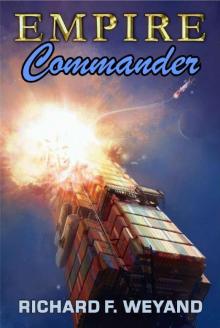 Commander
Commander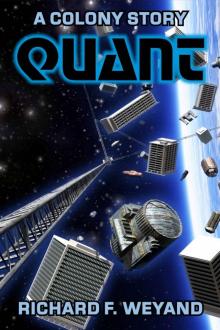 QUANT (COLONY Book 1)
QUANT (COLONY Book 1) EMPIRE: Renewal
EMPIRE: Renewal GALACTIC SURVEY (COLONY Book 3)
GALACTIC SURVEY (COLONY Book 3) Campbell- The Problem With Bliss
Campbell- The Problem With Bliss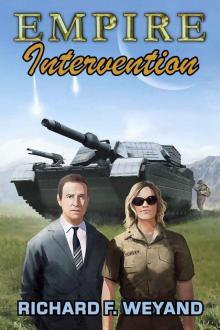 EMPIRE: Intervention (EMPIRE SERIES Book 13)
EMPIRE: Intervention (EMPIRE SERIES Book 13)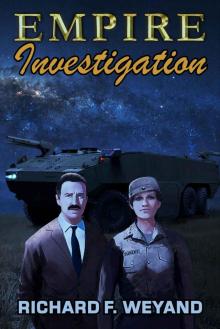 EMPIRE: Investigation
EMPIRE: Investigation A Charter for the Commonwealth
A Charter for the Commonwealth EMPIRE: Resistance
EMPIRE: Resistance EMPIRE: Warlord (EMPIRE SERIES Book 5)
EMPIRE: Warlord (EMPIRE SERIES Book 5) EMPIRE: Resurgence
EMPIRE: Resurgence EMPIRE: Conqueror (EMPIRE SERIES Book 6)
EMPIRE: Conqueror (EMPIRE SERIES Book 6)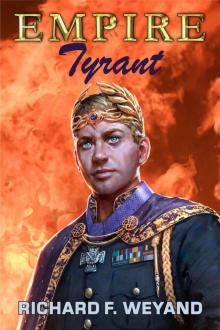 Tyrant
Tyrant Usurper
Usurper Galactic Mail: Revolution! (Childers Universe Book 3)
Galactic Mail: Revolution! (Childers Universe Book 3) Galactic Mail_Revolution!
Galactic Mail_Revolution! Childers
Childers CHILDERS_Absurd Proposals
CHILDERS_Absurd Proposals